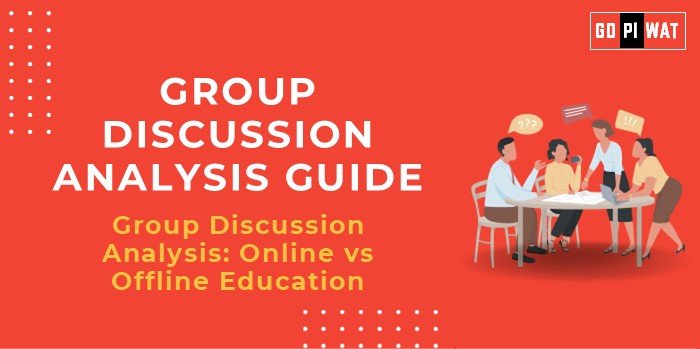📋 Group Discussion Analysis: Online vs Offline Education
🌐 Introduction to Online vs Offline Education
📖 The educational landscape has seen transformative changes with the advent of digital technology, particularly since the COVID-19 pandemic. This shift has spurred a debate on the effectiveness and future role of online versus offline education, making it an important topic for B-school discussions.
Traditional offline education has been a long-standing approach, providing structured, in-person interaction. Online education, initially a supplementary tool, surged during the pandemic as institutions worldwide adapted to remote learning. This debate highlights the strengths, weaknesses, and potential hybrid models that combine both methods.
📊 Quick Facts and Key Statistics
- 🌍 Global E-Learning Market: Projected to reach $457.8 billion by 2026, reflecting rapid adoption across educational sectors globally.
- 🧠 Retention Rates: Online learning can increase retention rates by 25% to 60%, while traditional in-person classes typically achieve 8% to 10%.
- 🎓 Preference Trends: 54% of students prefer traditional classrooms, while 46% favor online classes for flexibility and accessibility.
- 🏫 University Shift: By 2024, 98% of universities globally offer online programs.
- 🌱 Environmental Impact: Online learning reduces energy usage by 87% and carbon emissions by 85% per student.
🤝 Stakeholders and Their Roles
- 🏫 Educational Institutions: Adapt curricula for online and offline learners.
- 🏛️ Government Bodies: Fund initiatives and bridge digital divides.
- 👨👩👧👦 Students and Parents: Drive demand based on preferences and access to resources.
- 💻 Technology Providers: Innovate platforms and tools to enhance online learning.
- 🏢 Employers: Recognize credentials from both online and offline institutions.
🎯 Achievements and Challenges
🌟 Achievements:
- 📶 Accessibility: Democratizes learning, especially in underserved areas.
- 🕒 Flexibility: Adapts to students’ and professionals’ schedules.
- 📚 Enhanced Retention: Interactive content and on-demand access improve outcomes.
⚠️ Challenges:
- 📉 Digital Divide: Limited access in rural or disadvantaged regions.
- 🤔 Distraction and Motivation: Online classes may reduce focus and engagement.
- 🤝 Lack of In-Person Interaction: Offline education builds essential social skills.
🌍 Global Comparisons
- 🇫🇮 Finland: Integrates digital tools into hybrid models for personalized education.
- 🇺🇸 United States: Expands online programs in higher education while retaining traditional K-12 models.
📄 Structured Arguments for Discussion
🔹 Supporting Online Education: “Online education enables flexibility and accessibility, allowing students from diverse backgrounds to access quality learning resources.”
🔹 Supporting Offline Education: “Physical classrooms promote engagement, discipline, and collaboration, creating a holistic learning environment that’s hard to replicate online.”
🔹 Balanced Perspective: “Both online and offline education offer distinct benefits, suggesting a hybrid model that leverages the strengths of each approach.”
📊 Effective Discussion Approaches
- 📈 Statistical Impact: “With the e-learning market expected to reach $457.8 billion by 2026, digital education is reshaping learning worldwide.”
- ⚖️ Contrasting View: “Online learning offers flexibility, but traditional classrooms provide structure and interaction.”
- 🔗 Hybrid Approach: “Many advocate for a balanced mix of online and offline education to meet diverse needs.”
💡 Strategic Analysis
Strengths:
- 🌐 Online: Flexible, scalable, eco-friendly.
- 🏫 Offline: High engagement, structured, supports social skills.
Weaknesses:
- 📉 Online: Technology-dependent, lacks in-person interaction.
- 📅 Offline: Fixed schedules, limited accessibility.
📚 Connecting with B-School Applications
- 💼 Real-World Applications: Hybrid models in project management and team collaboration.
- 🎓 Sample Interview Questions: “How can institutions optimize online education for better engagement?”
- 🔍 Insights: Explore inclusivity and hybrid strategies for leadership development.


